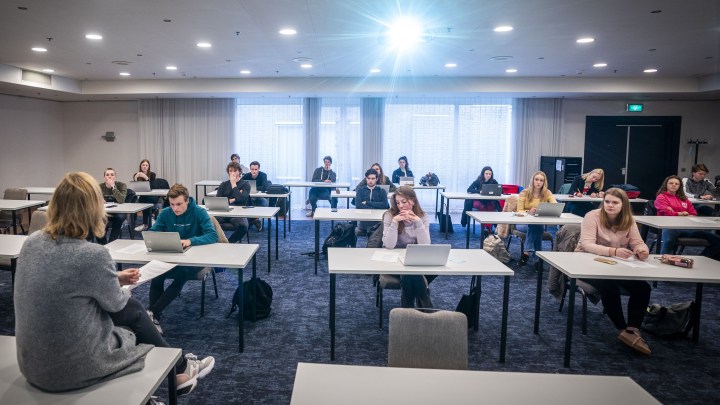
Hiring is one thing, but training workers is another challenge for companies
Hiring is one thing, but training workers is another challenge for companies

It’s the first day of orientation at the Conrad New York Downtown, a five-star Hilton hotel in lower Manhattan. All the hallmarks of “Welcome to your new job” are here: coffee and doughnuts at the back, PowerPoint presentation at the front.
The group is a mix of new and returning employees. Up to 75% of Hilton employees were furloughed during the pandemic. Since the beginning of the year, the company’s hired 12,000 workers, mostly in food service and housekeeping, and it’s looking for more.
All of them go through a two-week training course like this one — even those returning from furlough — because hospitality has changed.
“How’s the traffic been? A little stressful?” Marlene Poynder, the hotel’s general manager, asked the group. “Well, when you consider now that 70% of our guests arrive in their car, we need to give them a little leeway and empathize with them.”
The U.S. is faced with record-setting job openings, with food and hospitality leading the way. But the struggle isn’t over once companies get people on payroll. Next comes training a large pool of new employees, quickly and all at once.
And the pressure is on in the service industry. When you lump together high customer expectations, constantly changing COVID cleaning protocols and lots of new staff, service is inevitably going to suffer.
“Things are a little bit slower because everybody’s trying to get back into the groove,” Poynder said. “I think moving forward, the public will be less forgiving.”
This is why Hilton is spending so much time on training. And, of course, time is money. A survey from Training magazine says it costs a company, on average, $1,200 to train each worker.
And that doesn’t even include the institutional knowledge an employer loses when an employee leaves, which is happening more often in this tight labor market.
“It’s often not documented, but is in the heads, and sometimes the hands, of people who have worked in that business for decades,” said Dorothy Leonard, a professor of business administration at Harvard Business School.
An example of this, say, is a bartender who knows a regular customer so well they plunk down their drink of choice before they even order.
“That kind of knowledge, much of which is tacit, it’s not written down, it’s not documented, is difficult to capture and transfer to new hires,” Leonard said.
For experienced employees, work can become intuitive — so intuitive that they’re often not able to articulate how or why they do something the way they do. It’s why, Leonard said, new workers need to work hand in hand with experienced employees.
That’s difficult now in industries where businesses are practically building their workforce from scratch. Chipotle is combating the knowledge-shortage problem with what it calls certified training restaurants.
“That means that everyone in that restaurant is trained to be able to, you know, train other people,” said Jarolin Maldonado, who oversees management of seven Chipotle restaurants in New York City.
Every new hire is paired with a certified training employee. Chipotle is hiring 20,000 workers.
“You know it is a little bit overwhelming, but that’s where we can go back and fall back on the tools that we have here,” she said, like videos on how to make guacamole.
And the how-to videos and workshops continue well into an employee’s tenure. Back at the Conrad hotel, Poynder said the pandemic has made workers more worried about job progression.
“They were so concerned that their careers would stall and that they’ve lost 18 months,” she said.
Hilton recently started a three-month training program that teaches employees business skills like marketing and revenue management. Because in a tight labor market, companies can’t afford to watch all that hard-earned institutional knowledge get scooped up by someone else.
There’s a lot happening in the world. Through it all, Marketplace is here for you.
You rely on Marketplace to break down the world’s events and tell you how it affects you in a fact-based, approachable way. We rely on your financial support to keep making that possible.
Your donation today powers the independent journalism that you rely on. For just $5/month, you can help sustain Marketplace so we can keep reporting on the things that matter to you.











